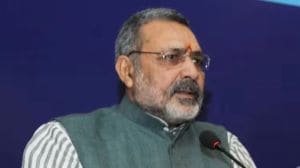We can compete
This refers to the article, ‘Who’s afraid of WTO? Not us’ by Madhu Kishwar (IE, January 22). There is no need t...

This refers to the article, ‘Who’s afraid of WTO? Not us’ by Madhu Kishwar (IE, January 22). There is no need to be afraid of WTO. What is needed is to understand the usefulness of WTO and use it to your fullest advantage and ensure that it does not damage any part of our economy. Japan grew without the WTO and its auto industry grew so much that the US pressurised Japan to restrict the number of cars they would export to US. Yet Toyota is now the second biggest car manufacture in the world, ahead of Ford. Japan followed its own policy to become a large exporter, since its internal market is small and they lack a lot of the raw materials.
We must learn from the West to be selfish and look after our interest. It is silly to see ministers and India Inc showing surprise at the US legislation banning outsourcing. What are we surprised about? Steel imports were restricted by US, was that fair? It is the developing countries which need to learn from the developed countries that each country will have to look after their own interest. We are the silly people who think that the developed countries will allow us to use their textile market or the agriculture market or the pharmaceutical market. They worry about their local industry, local farmers and local labour force. We live in a unreal world and follow WTO, cut import duties so that we lose jobs in India and allow foreigners’ access to our markets. Every time imports are encouraged we lose jobs, instead decrease excise duty and make locally produced products cheaper and more competitive.
The benefits of outsourcing, development of our IT industry and call centres are due to the low cost of labour and the lost cost of infrastructure and has nothing to do with WTO. This development is not due to generosity shown to India by the West. It is largely a simple economic decision. Sourcing from India creates jobs, but low value jobs. Parts, unbranded goods from India, gives labour value to the economy. The retail price of the items sourced from India will be at least 3 to 10 times the value India got. We need to have more value added work. It is the stated policy of America that they will, at all cost, protect the high standard of living of the Americans. And why not? Similarly, it should be our policy to increase employment and increase the standard of living of our people, at all cost.
— Ramesh Chauhan New Delhi
Not cricket
•Anju George’s interview and her responses were very good (‘He…taught me how to behave…’ IE, January 29). I wish her the best of luck, especially at Athens. But I disliked one thing in the interview. Why should her earnings be compared with that of cricketers? Cricketers are getting paid more because of the popularity of their game. It doesn’t matter if they are competing with only four or five countries. Also, if Sachin Tendulkar asks people to drink Pepsi, its sales boom.
How many people can recognise Anju George? How many people pay Rs 10 to watch an international athletic event? Anyway, it is not fair to crib about the amount of money cricketers make. Let cricketers make whatever they are making. We should focus on making other sportspersons earn too — not to reduce what cricketers are making!
— Rajasekhar K.On e-mail
Moral support
• I am really surprised at your criticism of Governor Rama Jois telling the truth about the jungle rule of the Yadav couple (‘There’s a line, Guv’, IE, January 28). It’s the moral support that people like you extend to them that encourages them to continue their jungle raj and to drag the state into the abyss of human degradation.
— Chiman A. Patel On e-mail



- 01
- 02
- 03
- 04
- 05




























